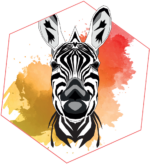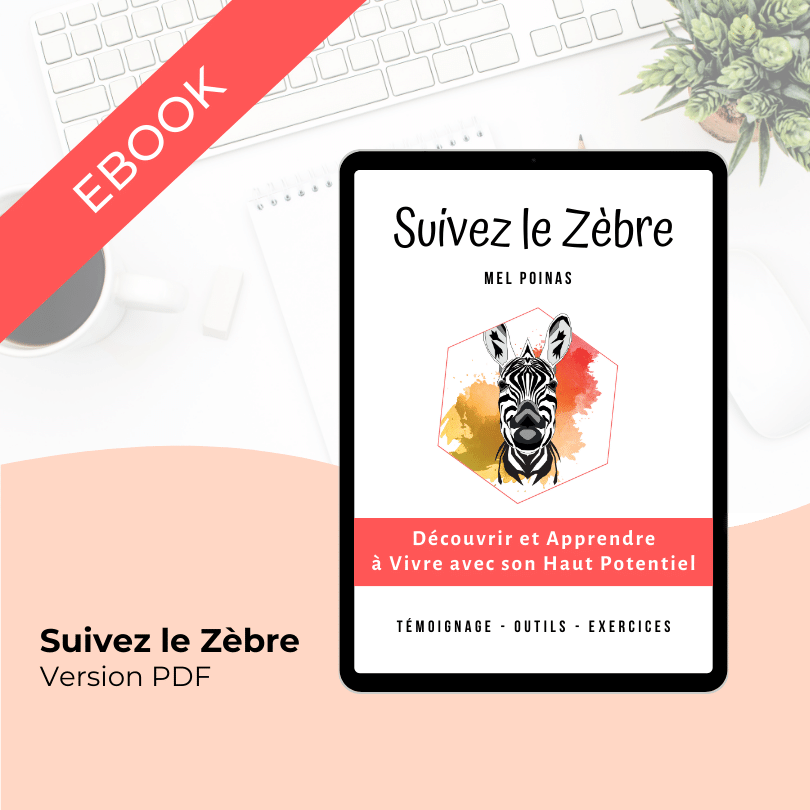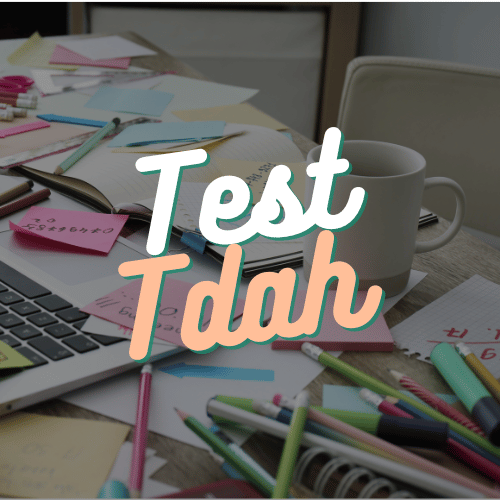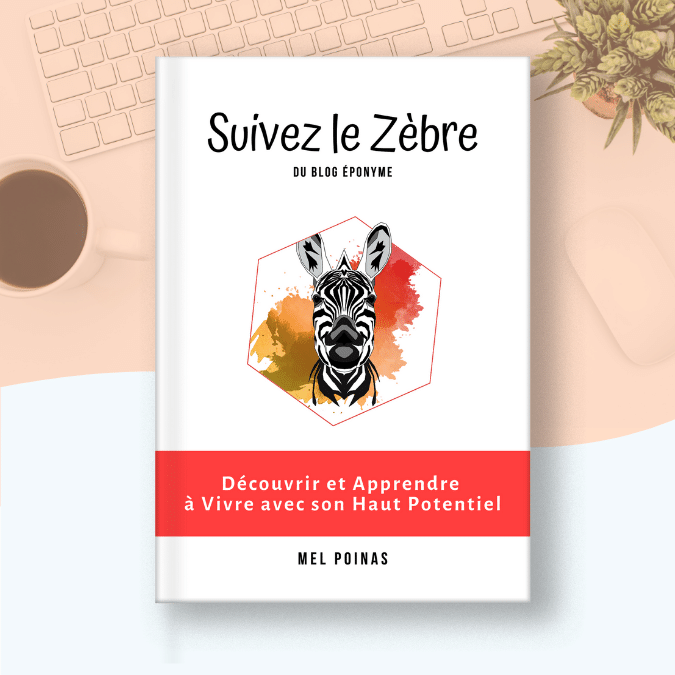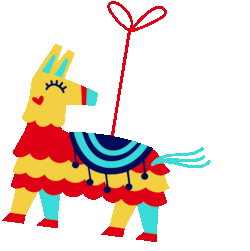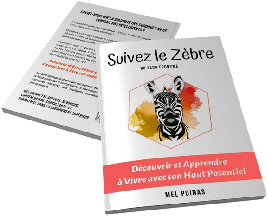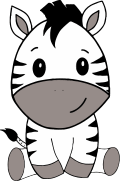Tell me, Auntie, what is a zebra?
Alice, my teenage goddaughter, asked me this question one Christmas when she was 11 years old while I was writing an article on my blog.
How to explain without pretension, what is a gifted person and what it means to be gifted?
I find it much easier to explain it to a child. Children still have an open-mindedness that has not been ‘normalised’ by society. And they are also less judgemental, which makes them more open-minded.
So, what is a zebra?
The term ‘zebra’ is officially entered the French dictionary in 2020 and will be present in the print editions. Jeanne Siaud-Facchin used this term to describe and identify gifted, high potential or ‘philo-cognitive’ people (Fanny Nusbaum).
A zebra is a person who has an IQ above 130 and a heightened sensitivity to the world. To be a zebra, one must have both characteristics, emotional sensitivity alone is not enough.
A gifted person has a brain with its own analytical capacities. Thinking is said to be tree-like or divergent (a more scientific term), with one idea leading to another and so on.
The speed at which information travels in our brains is said to be much faster, up to three and a half meters per second, compared to two per second for non-zebras people.
This rapid flow of information would allow gifted people to have a wider field of vision on a given situation and to capture certain details more easily and quickly. It is a purely cognitive functioning related to highly developed neuronal connections (synapses).
This atypical functioning has allowed to gather a certain number of characteristics that are expressed in all individuals with this functioning: discover these characteristics.
One is born a zebra, one does not become one.
Am I a zebra?
To know officially, you can take the WAIS test. Of course, before taking the test, there is first the self-assessment diagnosis. By reading books or articles on High Potential, you can already have some clues about your own functioning.
HIP: Between self-evaluation and official test
Even though self-evaluation is necessary to find the trail of stripes, the only way to be identified as a ‘zebra’ is to take the test with a certified psychologist. Humans are full of cognitives biases that distort their judgment, especially when it comes to their own personality. To avoid the Barnum effect, I advise you to go get tested. Of course, you are free to do it if you want. It is not an obligation. However, you cannot claim to be a zebra until you have been tested.
You can make an appointment with a psychologist specialised in giftedness. The good news is that there are more and more of them so there is less delay.
Don’t panic, it will be fine
I would rather reassure you about the discovery, or possible questioning of: am I a ‘zebra’?
The first fear is often related to the test. I finally have a piece of the answer, what if I fail the WAIS test? What if, in the end, it is not that? And how can we really evaluate a brain? If we are gifted, do we look alike all other gifted people? Besides, I am not really intelligent…
The incredible world of giftedness
All these questions are completely legitimate, when one begins to be ‘confronted’ with the world of giftedness. Everyone has their own opinion on the matter. Sometimes it can feel overwhelming with the flow of information. There are different profiles: laminar and complex (Fanny Nusbaum), there are highly sensitive and emotional people who talk about High Emotional Potential, while others only focus on intelligence and IQ.
When I started the blog, in 2017, I was in explorer mode. I did a lot of research on the subject. I wanted to understand everything about giftedness, gifted individuals, zebras, high potential individuals, etc. It had become my new passion. However, today my approach is different.
How to identify what is true and what is fake?
I realised that even professionals have difficulty agreeing. There is no consensus among psychologists, doctors and health professionals to accurately define what a gifted person is.
However, we cannot blame them; the brain is so full of surprises! In the positive side, the subject is being debated. More an more scientific and concrete studies are being conducted to try to find answers. Fanny Nusbaum and Olivier Revol have already identified two types of functioning among zebra profiles: laminar and complex. It is a starting point.
Taking a step back to avoid getting lost: every human being is unique
We are trying to define what is a zebra profile or a High Intellectual Potential person (synonyms), there is still a long way to go. We are all different and we are influenced by our heredity, our environment, our education, our life course… Let’s keep this in mind to avoid downward slides, communitarianism and the emphasis on intelligence as a value criterion.
I am convinced that there is no truth. That the only truth we have is our own, that of our emotions, that of our vision, that of our interpretation… especially in human relationships/ interactions.
I repeat this often because I think we need to be able to take a step back and have our own opinions, in full awareness and not make generalities from personal experience. I am one zebra among thousands of others and what I say is only the way that I live my giftedness.
Nevertheless, we will try to answer some questions to try to better understand what a zebra is.
Are all zebras alike?
Of course, when you are gifted we share common characteristics with other zebras. For me, being a zebra, or gifted, or HIP, or however you want to define yourself, means having an atypical relationship with the world,with society, with rules (especially authority), with people, with animals, with consciousness, and having very quick analytical and problem-solving skills.
There are things that we do very quickly… And there are also many things that we don’t understand because they don’t seem logical or fair. We don’t always agree with the world we live in. A world devoid of logic and common sense that very often makes it difficult for us to adapt. This can explain why our relationship with others is sometimes complicated.
The feeling of being misunderstood
We feel misunderstood. It is as if we were not meant to understand the relationship codes: what we can do and what we should not do. It is also very difficult to understand what the other person does not understand…
But relational or social intelligence is something that needs to be worked on. We are used to relying on our own innate intelligence rather than our acquired one, and with a little perseverance, we can manage and control our emotions. Fortunately, not all zebras are alone, misunderstood and friendless. Just as people who are not zebras can be lonely and friendless. There are some very nice gifted people, and I am sure there are some not so nice ones, just like the human being and the society we live in.
Once again, there are no rules, no general truth.
Being a zebra, as if life were more colorful!
But sometimes this intensity, this emotional overflow will also make us more vulnerable. Vulnerable to hypersensitivity, to addictions, to manipulators, to questioning. Sometimes we completely block on an event or a situation that made us feel too much emotions.
Those around us do not understand why we are so preoccupied. Why can’t we put the situation into perspective? It gives us a nutty side! When something really gets me worked up, when I block, when I can’t get over it, I say that I have my little bike spinning in my head.
Is the WAIS a reliable test?
You often ask me if the WAIS test is reliable and enough.
For the most sceptical (which I understand), the question is often can we assess emotional intelligence as well as cognitive intelligence with a test?
I don’t know if we can assess emotional intelligence, but emotions comes from a reception and interpretation of our cognitive system.
Everything is related:
– Our thoughts
– Our emotions
– Our behavior
– Our body’s reactions
I believe there is an unfailing link between our emotions, our thoughts and our behavior, and that all of this is cognitive intelligence.
What is certain is that the test can evaluate the reasoning capacities and the speed of information processing as well as the adaptation facilities that we have.
Why the WAIS?
The WAIS (currently Version IV) is a test that was originally created to assess people with intellectual disabilities. However, specialists realized that it could also be used in the other direction and assess people with analytical skills.
Personally, I think that we should take some distance with the results of the test. Of course, it is reassuring when you’ve been looking for, during a part of your life, why you felt a bit out of place to finally have an answer.
For me, it was a great relief to finally understand that I was not crazy! However, I put into perspective the number I was given. 120 / 130 / 140 / 150 / 160… Do we really want to define ourselves only with and IQ? And continue this society of hyper-performance? I don’t! I mean, if you have 130, you are worth less than someone who has 160? What about the non-zebras then?
Are they considered inferior because they have an IQ of 110 or 102? Yes, it is absurd when you read it… So let’s no fall into that. Let’s not define ourselves only by this number and let’s not consider others by it.
Let’s keep in mind that this test is there to help us understand who we are by allowing us to discover our cognitive functioning.
A test does not define who you are or your value
For my part, I just needed to understand. To put my finger on the difference.
Now that I understand, I don’t want to lock myself into this simple and unique ‘role’ of zebra. I needed it at one point. I was reassured that I was not alone and that there was a rational explanation for my sometimes offbeat behavior.
Or at least not defining myself solely through that prism. I am, and you are, richer and more complex than that!
The test will only put another label, stick you in the box: more gifted than the norm. If the norm even exists! Because in the end, there are many zebras on earth.
In France, it is estimated that 2% to 10% of the population is gifted. Why such a large gap? Well, because 2.3% is the official figure but there are so many undetected people that it can’t be 100% reliable.
Anyway, today, there is no better way to detect giftedness than this test.
Conclusion, what is a zebra?
Finally, it is very difficult to define what a gifted person is. Besides, there are some very empathetic gifted people, others less so, others who are maths geniuses, others who are art geniuses… Our potentials do not express themselves in the same areas.
It’s hard to really categorize us, and that’s good.
I believe that the speed at which we think and make associations of ideas or projects are quite characteristic of our functioning. If we are not stimulated, we get bored very quickly. This is our worst enemy as a zebra: boredom!
There’s also the fact that our cognitive system is quick off the mark, which makes us feel things quickly and intensely.
Being a zebra is one more characteristic, but it does not define ALL of who you are. Gifted or not, the most important thing is to feel good about yourself and be yourself.
I discovered personal development at the same time as being gifted, it really helps me in my daily life, especially to put things in perspective and to silence the little bike in my head.
I’m also working on the notions of mindfulness and letting go and that calms me down a lot.
The most important thing is to find one’s place in a world
that leaves us very little.
You can find a list of zebra characteristics in this article: thezebra’s characteristics.
To go further, you can read
- Giftedness : 20 characteristics of complex and laminar profiles
- What is being Gifted?
- Giftedness : Explanations and record of Mel Poinas
- The best books about High Learning Potential
- How to take the WAIS 4 test?
- Giftedness FAQ
